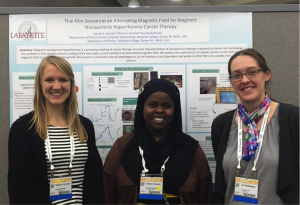Affordable Options for Nanoparticle Research
 Zoe Boekelheide, assistant professor of physics, and two EXCEL scholars, Zainab Hussein ’17 and Shannon Hartzell ’16, have found a more affordable way to conduct some magnetic nanoparticle experiments. The research team is studying magnetic nanoparticle hyperthermia, a potential cancer treatment in which nanoparticles are injected into a tumor and then exposed to an alternating magnetic field, producing heat to damage the cancer cells. When nanoparticles are assessed for suitability for this treatment, the thermal measurements are often performed with expensive fiber optic thermometers because of concerns of self-heating in more affordable thermocouples. Thermocouples are devices in which a junction between two wires made of dissimilar conductors produces a measurable voltage proportional to the temperature. Boekelheide and her team have performed theoretical calculations and lab experiments to show that in most cases thermocouples may be used for this measurement, and have provided guidance on selecting thermocouples for accurate measurements. Their results make these measurements accessible to a wider group of researchers around the world who may not have access to specialized fiber optic sensors. The team also found that lithographically patterned thin film thermometers can be used, opening the door for integrated “lab-on-a-chip” hyperthermia measurements in the future. Hussein and Hartzell presented the results of their research at the American Physical Society meeting in March and a manuscript on this research was published in the journal IEEE Transactions in Magnetics in July.
Zoe Boekelheide, assistant professor of physics, and two EXCEL scholars, Zainab Hussein ’17 and Shannon Hartzell ’16, have found a more affordable way to conduct some magnetic nanoparticle experiments. The research team is studying magnetic nanoparticle hyperthermia, a potential cancer treatment in which nanoparticles are injected into a tumor and then exposed to an alternating magnetic field, producing heat to damage the cancer cells. When nanoparticles are assessed for suitability for this treatment, the thermal measurements are often performed with expensive fiber optic thermometers because of concerns of self-heating in more affordable thermocouples. Thermocouples are devices in which a junction between two wires made of dissimilar conductors produces a measurable voltage proportional to the temperature. Boekelheide and her team have performed theoretical calculations and lab experiments to show that in most cases thermocouples may be used for this measurement, and have provided guidance on selecting thermocouples for accurate measurements. Their results make these measurements accessible to a wider group of researchers around the world who may not have access to specialized fiber optic sensors. The team also found that lithographically patterned thin film thermometers can be used, opening the door for integrated “lab-on-a-chip” hyperthermia measurements in the future. Hussein and Hartzell presented the results of their research at the American Physical Society meeting in March and a manuscript on this research was published in the journal IEEE Transactions in Magnetics in July.